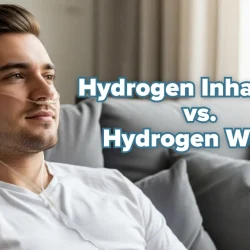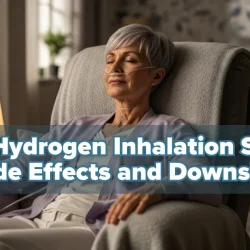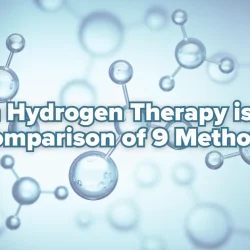In recent years, numerous health benefits of hydrogen have been reported, gathering attention not only in the medical field but also in the beauty and wellness industries.
This article will break down the basics of hydrogen inhalation, explaining what it is, its science-backed benefits, safety, and how you can get started. Whether you’re considering trying it or are simply curious about new health and wellness trends, this guide is for you.
What is Hydrogen Inhalation Therapy?

Hydrogen Inhalation Therapy (also called hydrogen gas inhalation therapy) is a method of introducing hydrogen gas into the body by breathing it in through the nose or mouth.
Hydrogen has a unique property: it selectively neutralizes harmful free radicals (like hydroxyl radicals) that are generated in our bodies. As a colorless, odorless, and tasteless gas, hydrogen is considered harmless to the human body. Any excess hydrogen is naturally expelled through breathing.
These characteristics have made it a popular choice as a safe and simple wellness practice.
A Japanese Breakthrough in 2007
Research into the medical applications of hydrogen gained momentum following a landmark paper published in 2007. This study, published in the scientific journal Nature Medicine and originating in Japan, spurred research worldwide by suggesting that molecular hydrogen could selectively neutralize harmful free radicals.
Today, its effectiveness has been reported for various conditions and symptoms. It’s available at medical institutions and wellness salons, and at-home hydrogen generators are becoming increasingly common.
Recognized as “Advanced Medical Care B” in Japan in 2016
In 2016, Hydrogen Inhalation Therapy was approved under the “Advanced Medical Care B” system by Japan’s Ministry of Health, Labour and Welfare. This signifies that its medical value has been recognized to a certain standard.
Although it was removed from the list in 2022 due to the strain on the healthcare system during the COVID-19 pandemic, medical research continues, and more scientific evidence is being accumulated.
Gaining Popularity Among Celebrities and Athletes
In recent years, many celebrities and athletes in Japan have started using hydrogen inhalation to support their health and performance, including famous actresses and professional athletes.
This trend is also gaining traction internationally. For example, a Japanese TV show recently reported that the MLB’s Los Angeles Dodgers have installed a hydrogen inhalation machine in their players’ nap room.
Hydrogen inhalation therapy is a method of breathing in hydrogen gas, a selective antioxidant that is considered safe and has gained scientific attention since a key 2007 study in Japan.
6 Potential Benefits of Hydrogen Inhalation Therapy
Research is ongoing into the various effects of hydrogen inhalation on a wide range of health conditions, as well as its beauty and wellness benefits.
Here are six of the most promising potential benefits being studied:
- May Help Neutralize Harmful Free Radicals
- May Help Reduce Inflammation and Alleviate Allergy Symptoms
- Potential to Support Cancer Treatment by Reducing Side Effects
- May Help Protect the Brain, Potentially Aiding in Dementia and Parkinson’s Prevention
- May Enhance Skin Health by Reducing Blemishes, Wrinkles, and Sagging
- May Improve Sleep Quality and Aid in Fatigue Recovery
1. May Help Neutralize Harmful Free Radicals

The most significant benefit of hydrogen is its selective antioxidant effect. Our bodies produce free radicals (also known as reactive oxygen species) through normal metabolic processes like breathing, as well as from external factors like stress, UV radiation, and smoking.
While some free radicals are necessary for bodily functions, an excess can cause oxidative stress, damaging cells, DNA, proteins, and lipids. This process contributes to aging and various diseases.
Hydrogen selectively targets and neutralizes the most harmful free radicals, such as hydroxyl radicals, as first reported in a groundbreaking 2007 Nature Medicine article. Because hydrogen molecules are so small, they can penetrate every part of a cell (including the mitochondria and nucleus), delivering their antioxidant benefits efficiently throughout the body.
This action is expected to not only slow down the aging process but also help prevent and improve lifestyle-related diseases like arteriosclerosis, diabetes, and hypertension, in addition to the other benefits discussed below.
2. May Help Reduce Inflammation and Alleviate Allergy Symptoms

Hydrogen also possesses powerful anti-inflammatory properties. Inflammation is at the root of many diseases and symptoms, and controlling it can lead to significant relief.
While inflammation is a natural protective response, chronic or excessive inflammation can damage tissues. Hydrogen helps regulate this response by suppressing the production of inflammatory cytokines (substances that trigger inflammation).
This effect has been demonstrated in human clinical trials. For example, a randomized, placebo-controlled clinical trial published in Journal of Cellular and Molecular Medicine, found that hydrogen gas inhalation significantly reduced inflammatory markers and improved serum lipid and liver enzymes in patients with non-alcoholoc fatty liver disease (NAFLD).
Similarly, this anti-inflammatory effect is particularly promising for conditions involving inflammation, such as allergic reactions, atopic dermatitis, and autoimmune diseases like rheumatoid arthritis.
3. Potential to Support Cancer Treatment by Reducing Side Effects

One of the most exciting areas of research is the use of hydrogen therapy to support cancer treatment.
While chemotherapy and radiation are effective treatments, they often come with severe side effects that diminish a patient’s quality of life. These side effects are partly caused by the massive oxidative stress and inflammation induced by the treatments.
A systematic review published in Asian Pacific Journal of Cancer Prevention analyzed multiple studies and concluded that hydrogen therapy, including inhalation, can alleviate the side effects of conventional treatments like radiotherapy and chemotherapy, thereby improving patients’ quality of life.
To learn more, read our full guide on “Hydrogen Inhalation for Cancer: Does It Work? Latest Evidence & Safety.
4. Protects the Brain, Potentially Aiding in Dementia and Parkinson’s Prevention

Hydrogen can cross the blood-brain barrier, offering what appears to be protective effects to brain cells. The brain is particularly vulnerable to oxidative stress, and hydrogen’s antioxidant properties are expected to help preserve brain function.
For example, a pilot trial on community-dwelling elderly adults found that 4 weeks of hydrogen gas inhalation led to significant improvements in cognitive function, along with reduced oxidative stress markers.
Similarly, while it involved hydrogen water rather than inhalation, a randomized, double-blind, placebo-controlled pilot study on patients with Parkinson’s disease found that daily consumption significantly improved their UPDRS scores (a scale for disease severity) over 48 weeks, with no adverse effects.
5. May Enhance Skin Health by Reducing Blemishes, Wrinkles, and Sagging

Hydrogen’s antioxidant power offers significant potential benefits for the skin. Skin aging—including blemishes, wrinkles, and sagging—is largely caused by oxidative stress from factors like UV exposure.
By selectively neutralizing harmful free radicals, hydrogen is thought to reduce oxidative stress and protect skin cells from damage. This can support the skin’s natural turnover process, helping to maintain a healthy, youthful appearance.
A 2022 study on Japanese women in their 20s to 40s found that hydrogen inhalation for 25 minutes per day for two weeks improved their skin condition, including the fading of blemishes. Another Japanese research team reported study results suggesting that hydrogen inhalation may improve skin elasticity.
6. May Improve Sleep Quality and Aid in Fatigue Recovery

Hydrogen inhalation is also being explored for its ability to improve sleep quality and speed up fatigue recovery.
For sleep, an 8-week human trial, daily intake of hydrogen-rich water significantly improved subjective sleep quality (measured by standardized questionnaires) in adults, though this was oral rather than inhaled administration. There is also an ongoing double-blind, placebo-controlled study in humans that is directly evaluating hydrogen-oxygen mixed gas inhalation for insomnia, using sleep quality as a primary outcome.
For fatigue, a double-blind, placebo-controlled crossover study found that inhaling hydrogen-rich gas for 60 minutes before strenuous cycling significantly reduced subjective fatigue, improved performance, and enhanced markers of recovery compared to placebo.
Research suggests hydrogen’s antioxidant and anti-inflammatory properties may offer benefits for various conditions, including reducing inflammation, supporting cancer treatment, protecting the brain, enhancing skin health, and improving sleep and recovery.
Hydrogen vs. Other Antioxidants: What’s the Difference?
You may be familiar with other antioxidants like Vitamin C, Vitamin E, and polyphenols. So, what makes hydrogen different?
There are three key distinctions:
- Selectivity: Hydrogen selectively neutralizes only the most harmful free radicals, leaving the beneficial ones intact. In contrast, many traditional antioxidants can’t distinguish between them.
- Bioavailability: As the smallest molecule in the universe, hydrogen can penetrate deep into every cell and organelle, including the mitochondria and nucleus. It can even cross the blood-brain barrier, reaching brain cells where many other antioxidants cannot.
- Safety: There is no risk of overdosing on hydrogen. The body uses what it needs, and any excess is simply exhaled. Some other antioxidants, particularly fat-soluble vitamins like Vitamin E, can accumulate in the body and cause side effects if taken in large doses.
Unlike other antioxidants, hydrogen is unique because it selectively targets only harmful free radicals, can reach every cell in the body, and carries no risk of overdose.
Is Hydrogen Inhalation Safe? Any Side Effects?

Hydrogen gas itself is colorless, odorless, tasteless, and non-toxic. To date, no serious side effects have been reported in the numerous studies conducted on hydrogen inhalation therapy, indicating a high level of safety.
Some people may wonder about the risk of explosion. However, a hydrogen explosion requires specific conditions (high temperatures of 570°C / 1058°F and a hydrogen concentration between 4-75%), which are not met during therapy. The small, light molecules diffuse quickly, preventing a dangerous buildup of concentration in a room.
The primary safety consideration is the quality of the device. Because this is a relatively new field, regulations are still developing. It is crucial to choose a device from a reputable manufacturer to ensure safety and efficacy.
While not a side effect, some people report temporary changes like drowsiness or frequent urination when they begin. These are sometimes referred to as “adjustment reactions.”
Hydrogen gas is considered very safe with no serious side effects reported in studies. The main safety concern is ensuring you use a high-quality device from a reputable manufacturer.
How to Get Started with Hydrogen Inhalation
There are two main ways to begin hydrogen inhalation therapy: at a professional facility or at home.
1. At a Salon or Clinic

Specialized wellness salons or medical clinics offer sessions with high-concentration, professional-grade machines. This is a great option for beginners, as you can try it without a large initial investment and receive guidance from experts.
Prices vary, but a typical session might cost around $30-$50 per hour. Many places offer packages or monthly memberships for regular users.
2. At Home

Purchasing a personal hydrogen inhalation device allows you to use it in the comfort of your own home.
This requires an initial investment, with high-performance machines costing from several hundred to several thousand dollars. However, for long-term, frequent use (the ideal is often cited as one hour or more per day), it can be more cost-effective than visiting a salon. It also offers the convenience of unlimited access. Rentals are an option, but the selection is often limited.
Steps to Start at Home
- Choose a Device: Consider performance (hydrogen output), safety features, cost, and ease of use.
- Set It Up: Place the device in a well-ventilated area near a power source.
- Start Your Sessions: Begin with shorter sessions (10-15 minutes) and gradually increase the duration. An hour a day is often recommended for optimal benefits.
- Be Consistent: Like any wellness routine, consistency is key. Try to make it a daily habit.
You can start hydrogen therapy by visiting a professional salon or clinic for individual sessions, or by purchasing a personal device for convenient, long-term use at home.
Frequently Asked Questions About H2 inhalation
To help you get a clearer picture, we’ve compiled answers to some common questions.
Q1: Is hydrogen inhalation covered by insurance?
Currently, it is not covered by insurance and is considered an out-of-pocket expense.
Q2: How long does it take to feel the effects?
This varies greatly by individual. Some people feel a difference the same day, particularly with fatigue and sleep. For benefits like improved skin, it may take 1-3 months of consistent use.
A survey of 146 users in Japan found that 43% felt an effect by the next day.
Q3: How often should I do it?
Ideally, 60 minutes daily is recommended, but starting with 2-3 times a week is also beneficial. Regular, consistent sessions are more important than infrequent long sessions.
Q4: Is this just pseudoscience?
The medical effects of hydrogen are supported by numerous papers published in international scientific journals. Research is actively being conducted at institutions worldwide. While it’s not a “cure-all,” and you should be wary of exaggerated claims, it is not considered pseudoscience.
Q5: Have there been any fatal accidents?
There are no reports of fatal accidents caused by properly managed hydrogen inhalation devices.
While a news story from China circulated, a causal link to hydrogen inhalation was never established. Reputable devices are designed with multiple safety features.
Q6: Which hydrogen inhalation machine should I buy?
The best device depends on your budget and goals. Key factors to consider are:
- Hydrogen Output: Measured in ml/min.
- Cost: Initial price plus ongoing maintenance.
- Safety: Certifications and built-in safety mechanisms.
- Ease of Use: Operation, noise level, etc.
- Durability: Manufacturer’s warranty.
Q7: Do I need a device with high hydrogen output?
Generally, a higher output may lead to noticeable effects more quickly, especially for therapeutic purposes. However, it’s not necessary for everyone. High-flow devices are also more expensive and consume more power.
If you are not sure about how much is the best for you, we would recommend you to choose a machine with over 200ml/min at least based on current evidence.
Q8: Is HHO gas better than H2 gas?
Some sources claim that HHO gas (which is said to contain atomic hydrogen) is more effective than pure molecular hydrogen (H2) gas. However, this claim is not currently supported by scientific evidence. The vast majority of published research has investigated the effects of H2 gas, not HHO gas.
Q9: Is hydrogen recognised as doping?
No. As of 2025, molecular hydrogen is not on the World Anti-Doping Agency’s (WADA) Prohibited List. Therefore, athletes can use it without concern.
Q10: Can I use tap water in my hydrogen inhaler?
No. Most devices require purified or distilled water to produce pure hydrogen gas and to protect the machine from mineral buildup and damage. Always follow the manufacturer’s instructions.
The Takeaway
Hydrogen inhalation therapy is an emerging wellness practice with a growing body of scientific research suggesting potential benefits. Its core strengths appear to lie in its selective antioxidant and anti-inflammatory properties, which may help improve sleep, reduce fatigue, support brain health, and even mitigate the side effects of serious medical treatments.
While the therapy is generally considered safe with no major side effects reported, it’s important to remember that research is still ongoing. Hydrogen therapy should be seen as a supportive measure, not a replacement for conventional medical care.
If you’re curious about trying it, starting at a professional salon can be a good first step. For long-term use, investing in a high-quality home device from a reputable manufacturer is key.








